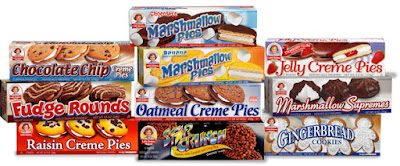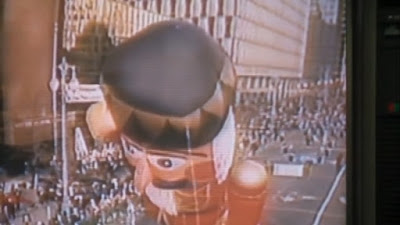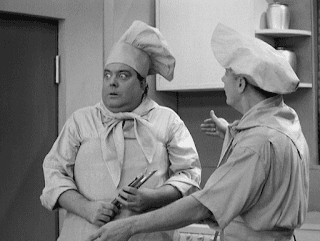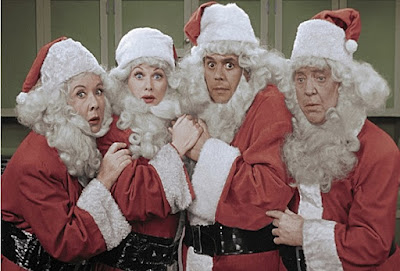It's not very often that I hear the word "Sunday," and a television announcer's deep voice doesn't appear from the deep recesses of my brain to shout SUNDAY, SUNDAY, SUNDAY!
I sometimes wonder, where is that from? Did I once hear it as a child? Where? How often must I have since it lives so deep inside my brain? I vaguely remember the constant "Big Foot" monster truck commercials when I was a kid, but I know I've since heard it in movies or television. I'm not really a fan of monster trucks or drag races, so is that really where it came from? Or was it just some goofy movie or TV show that caught on enough to enter the lexicon? Did I make it up? Is it even real?
The short answer is yes, the "Sunday, Sunday, Sunday!" catchphrase was a real thing! It was initially said by Chicago area auto racing announcer Jan Gabriel in the late 1960s for the US-30 Drag Strip in Hobart, Indiana. It found widespread use, often imitated or spoofed, during the monster truck craze of the 80s and 90s.
So, how did that catchphrase about Sunday catch on? Why say it in the first place? Who was Jan Gabriel?
I have so many questions today, but that just means it's time for another deep dive into "Commercials of YesterYear" as we look back at the original use of the slogan "Sunday, Sunday, SUNDAY!"
That reverberating, energy-infused call that builds to a triumphant "Sunday! Sunday! Sunday!" now invoked in pop-culture lore and heard in ads worldwide all came from the voice of Jan Gabriel.
Born in Wisconsin in 1940, Gabriel's family moved shortly after his birth to a small suburb southwest of Chicago, Illinois, called Palos Heights.
Gabriel seemed bound for the entertainment business, getting his start playing music at local dance halls and sock hops. While producing television commercials for the Community Discount department stores, Gabriel was a disc jockey for radio station WJOB in Hammond, Indiana.
Gabriel briefly tried his hand at driving race cars in 1960. In 1967, Gabriel was finally able to combine his love of motorsports and entertainment when he landed a gig as an announcer at the Santa Fe Speedway in Hinsdale, IL.
Gabriel set himself apart from other announcers by opting against the typical monotone play-by-play from a press booth at the top of the grandstand seats. Instead, he used various antics and excitement broadcast from a small platform next to the track.
Then, in 1968, opportunity knocked. The owner of Hobart, Indiana's US-30 Drag Strip, Ben Christ, was looking for a new marketing campaign for his racetrack. Ben wanted to advertise the family-friendly nature of his races and press home that they were running events on Sunday afternoons when the whole family could attend together. In his desire to ensure everyone knew what day the races were held, he created one of the most enduring phrases in motorsports promotion. The tagline he wrote would eventually be copied by announcers for decades that each would amp up to obscene levels of histrionics.
Back in 1968, however, Ben Christ enlisted the help of Steve Cronen from Starbeat Recording in Deerfield, Illinois. The script for the advertisement was dense with information, crammed into a 1-minute radio spot. In those days, commercials were recorded on actual tape in one take. There was no room for editing, and should the announcer make a mistake or run long, they'd have to start over.
The producer for the spot, Steve Cronen, went through nearly 50 different announcers before finding the vibrant voice of Jan Gabriel. Cronen said that after one 60 second reading by Gabriel, he knew he had his man. In an interview, he said, "It was the excitement, the way he delivered that line... That's because he really loved racing."
The original script for the ad called for two different announcers to trade intonations of "Sunday" back and forth, but the tape recorder Mr. Gabriel used was set up with a delay that allowed him to handle the repeated line himself. US-30 track owner Ben Christ loved it, and a partnership that lasted into the 1980s was born. Gabriel would return to the Starbeat Recordings studio nearly every week to produce new commercials for US-30 and other tracks around the country owned by Christ, making "Sunday! Sunday! Sunday!" a nationwide phenomenon.
Believe it or not, the multiple uses of Sundays actually have some thought and meaning.
The first "Sunday" is to inform the listener. "When? Oh, ok, Sunday."
The second "Sunday" is to confirm the date. "Sunday? We've got nothing to do that day. We can go!"
The third "Sunday" is meant to excite the listener. "Sunday! I'm going! Awesome!"
Some may say it's part of the zeitgeist now. It's been spoofed and joked about. I've searched YouTube for hours for a few good clips of the "Sunday, Sunday, Sunday!" I hear in my head, and it's impossible to come by.
Please click on the clip below to hear the original "Sunday, Sunday, Sunday!"
If you're like me, you're probably somewhat disappointed. Jan's voice in the ad has a synthetic, almost computerized, repetition to it rather than the deep over-the-top announcer voice we've come to expect. To be fair to Mr. Gabriel, that's not how I remember it being advertised on basic cable for monster trucks and demolition derbies.
Perhaps it's not Mr. Gabriel I remember hearing after all either.
As close as I could come to what I remember hearing would be the below advertisement.
This is much closer to what I remember. I feel like Monster Trucks and Monster Jam deserve their own article someday soon, and I don't want to get too deep into those topics just yet. The commercials of my memory include that over-the-top voice, the repeated "Sunday!" and off-the-wall catchphrases like the one used to close the above video "We'll sell you the whole seat, but you'll only need the edge!" Fantastic, crazy stuff!
So, what happened to Mr. Gabriel after those spots started airing, and how did Jan's tagline, so famous for small drag strips in the midwest, become synonymous with monster trucks?
Spending 14 years at the Santa Fe Speedway in Hinsdale, Illinois, Gabriel's showmanship endeared him to audiences. Unfortunately, the racing establishment and large corporations weren't as fond of his work. After 3 seasons working on the Indy 500 announce team, Gabriel was let go.
Jan claimed his boss Tom Carnegie told him he'd rather have a more conservative approach than Gabriel's excited conversational style. "We weren't a good fit," he said. "They wanted a just-the-facts guy, and I like to tell a story. That's not to say the Indy approach is wrong. It's just not my approach."
Gabriel brought in fans and celebrities during his 14 years at Santa Fe Speedway. Racing stars like Darrell Waltrip and Buddy Baker would sometimes appear on race day.
Still, it wasn't enough for Jan. In 1982, his production company, TV-One, would launch the nationally syndicated show Super Chargers. Acting as producer and host, Gabriel would cover all forms of racing as an oddball mashup of Hollywood celebrity and motorsports.
But, two years into the show, Gabriel admits he made a significant mistake. At the NATPE (National Association of Television Programming Executives) convention in 1984, Gabriel was there with other indicators trying to sell their programs. An offer was made to Gabriel to put Super Chargers on cable.
In 1984, cable television was still a new, relatively unproven concept, and Gabriel opted to stick with the traditional syndication method and turned down the cable opportunity. Jan once said, "Boy, was I wrong. With ESPN taking the good stuff, the Super Chargers show was left with what? Museums?"
Still, Gabriel pressed on for over a decade with his program. He went to Universal Studios in Hollywood and worked a deal to use various back lots. Bringing in stars like Connie Stevens and Tony Danza to host different episodes about Corvettes or NASCAR, Gabriel was able to join Hollywood glitz and glamour with the down and dirty world of auto racing. In one episode, Sally Struthers showed off her antique Ford collection. Tim Allen built a kit car in another, while Leslie Nielsen showed off his electric vehicles. Fans could see everything from Reggie Jackson learning to ride a motorcycle to Chuck Norris racing motorboats in the show's broad coverage of everything motorsports.
Super Chargers was more than just celebrity interactions. Super Chargers would cover races at small tracks that didn't have television contracts. They covered NHRA (National Hot Rod Association) events, NASCAR and struck it big when they began covering the early Monster Truck competitions.
Using what was called barter syndication, TV-One would produce the shows and give them to the television networks for free. Gabriel would then split the ad revenue with the networks. The show caught on, and in the second season, True Value Hardware agreed to underwrite the show as its main sponsor.
Gabriel and TV-One would also become the first to run "Big Foot" and seven other Monster Trucks side-by-side on nationwide TV, selling his Battle of the Monster Trucks VHS tapes. The advertisements for The Battle of the Monster Trucks felt like it was on a constant loop those days, and is likely where I remember hearing Gabriel's voice screaming SUNDAY! SUNDAY! SUNDAY! over and over again. Battle of the Monster TrucksVHS tapes sold over a million copies at $20 a pop. That's $20 million for the very math-challenged like myself. (I used a calculator, so you didn't have to!)
If you have 45 minutes, you can watch the VHS tape in its entirety in the below video:
The success of Battle of the Monster Trucks would lead to two other videos, Return of the Monster Trucks and War of the Monster Trucks.
Eventually, in 1994, the infomercial knocked Super Chargers off the air. Things like the Ginzu knife, Ronco (set it and forget it!), and the Bedazzler paid cash for air time, calling for an end to barter syndication deals. Once the show ended, Gabriel and TV-One continued to produce advertisements for furniture companies Nelson Brothers Furniture and Aronson's.
Even though the TV deal ended, Gabriel never gave up his dream of promoting small-time events as if they were big-time. As the Santa Fe Speedway closed, he took the Demolition Derby to nearby Route 66 Raceway in Joliet, Illinois. Every Saturday, he filled the 10,000 seat track with fans eager to see what he called the "roller derby on wheels," an event that combined racing and automotive destruction.
Gabriel and Steve Cronen of Starbeat Recordings teamed again during the late 80s and early 90s to bring many SRO Promotion's Truck and Tractor Pull Show commercials nationwide for the U.S. Hot Rod Association events. You can see a sample below, and this is where many people in America from my generation remember Jan's voice.
Other announcers imitated Gabriel's 'Sunday' schtick repeatedly until it all suddenly faded away. As NASCAR got big during the late 90s and the Monster Truck craze died off, the small independent tracks where Gabriel did most of his work disappeared.
Victims of underfinanced owners, high insurance costs, and a fan base wanting the glitz and glamor of what they saw weekly on television, the tracks couldn't stay in business for long. Facing low local interest and slow ticket sales, the track owners could only say no to wealthy real estate developers for so long.
The Santa Fe Speedway, where Gabriel got his start, is now a housing subdivision.
The US-30 Drag Strip, where Ben Christ advertised his races on - Sunday! - is now a parking lot.
Mr. Gabriel, in the end, realized his legacy came down to one single phrase. It made him a legend, putting him in a class with some pretty famous company. "I should have copyrighted my delivery," he once said. "There are only three signature lines in broadcasting. A Chicagoan named Al Dvorin had 'Elvis has left the building.' Michael Buffer did 'Let's get ready to rumble!' And I have 'Sunday, Sunday, Sunday!"
Considered perhaps the best promoter of Sunday besides a Preacher, Gabriel passed away from polycystic kidney disease on January 17, 2010.
Appropriately... it was a Sunday.










.png)





Comments
Sunday! Sunday! SUNDAY! See Jesus Christ and the twelve apostles with their blown fuel funny car!
ReplyDeleteSUNDAY!
Today is Sunday and my memories too.
ReplyDelete